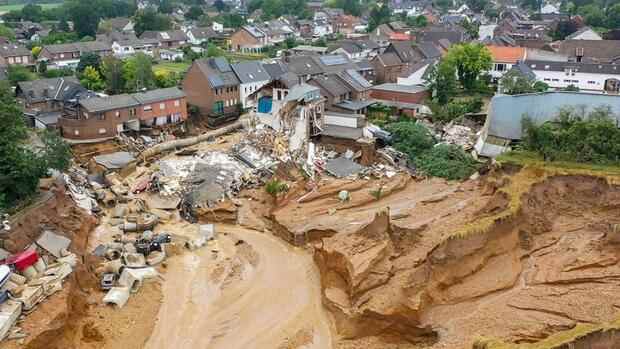Berlin Once a year, the water industry reads the riot act to politicians. Germany is a water-rich country. But that is changing with climate change. In some regions, water is becoming a scarce commodity at times. Sometimes there is also too much water, flooding and heavy rain events are increasing. The German Association for Water, Wastewater and Waste (DWA) warns that it is high time to prepare for drought and dryness.
Greater importance must also be attached to protection against flooding or local flash floods, the association states in a paper of demands that was handed over to the environmental policy spokespersons of the parliamentary groups on Monday.
According to the paper, the past year with the great drought in spring and extreme precipitation in summer has once again made society aware that climate change requires protective or adaptation measures.
There is no need for “short-term actionism after catastrophic events, but a sustained pursuit of strategic water management goals at all times, backed by reliable, long-term financing”.
Top jobs of the day
Find the best jobs now and
be notified by email.
According to the DWA, the economic consequences of a long-lasting drought are comparable to those of a flood disaster. Problems include the failure of power plants due to a lack of cooling water, restrictions on shipping, crop failures and problems with the drinking water supply.
These are seven central demands of the water experts:
Prohibit construction in flood-prone areas
While flood hazards are most prevalent near rivers, heavy rain-related flooding can occur anywhere. The municipalities therefore need heavy rain prevention planning and protection, for example through rainwater retention basins, according to the DWA’s demand. The approval procedures for this would have to be streamlined significantly.
In the opinion of the DWA, construction in flood areas must generally be prevented and more restricted in areas at risk of flooding. There are still too many exceptions to building bans. Soil sealing must be stopped.
Make critical infrastructure climate-proof
Extreme weather events could lead to a temporary total failure of water supply and sanitation. Critical infrastructure must be planned and built in a more climate-resilient manner, according to the demand.
While flood hazards are most prevalent near rivers, heavy rain-related flooding can occur anywhere.
(Photo: dpa)
Politicians should give more priority to civil protection. The infrastructure for flood forecasting is mentioned as an example. This must be uniform and understandable, and also be built in such a way that it is also available in extreme weather events.
Increased use of water for energy supply
Sewage gas, a by-product of municipal sewage treatment plants, can be used to produce electricity and heat. Around 1,500 combined heat and power plants are used in Germany for this purpose, especially at locations with large sewage treatment plants with a population of 100,000 or more.
For smaller systems, however, there is still considerable potential. In addition, the approximately 9,000 sewage treatment plant locations in Germany could be used for photovoltaics and wind power plants. The DWA also brings floating photovoltaic surfaces on water into play.
Saving drinking water
It is said that the supply of drinking water and personal hygiene must be ensured at all times. At the same time, the association is of the opinion that, especially in the commercial sector, there should be “a greater willingness, even including concrete legal obligations, to save drinking water by using rainwater and water reuse”. This is an “important building block” for the security of supply with limited capacities of the public water supply.
In the case of new buildings and the renovation of existing buildings, the DWA wants rainwater to be used to flush the toilets. The construction of rainwater cisterns should be regulated as mandatory, as this protects groundwater resources and cushions flood peaks. Praise goes to the industry: Many companies are on the right track in the field of recycling.
>> Read also: Conflicts over water use: Industry insists on plan for security of supply
tackle the agricultural turnaround
The DWA considers more efficient irrigation techniques necessary. In addition, certain crops that consume less water should be cultivated in regions with high water stress. Investments in agriculture are too often made with a view to efficiency and too little with regard to sustainability, it is said critically.
However, agriculture is not solely responsible for this. The food and agricultural industry, trade and consumers must be involved. It takes environmentally friendly food production. Food waste in production, trade and final consumption must also be reduced, as it leads to considerable unnecessary water consumption.
Modernize urban planning
A change towards water-conscious cities of the future is necessary. What is meant are so-called “sponge cities” with “blue-green infrastructure” through flood prevention, heat adaptation, rainwater and resource management.
Expand producer responsibility
According to the DWA, anyone who manufactures, treats or processes products and places them on the market should take more responsibility for their water compatibility. It’s not just about the costs of filtering out harmful inputs from the water. The avoidance or reduction of harmful entries must have priority.
More: The impact of climate change on the drinking water supply
